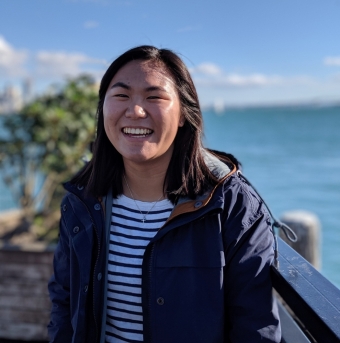
After decades nurturing future leaders in science and engineering, in 2010, Fiona Goodchild founded the Center for Science and Engineering Partnerships (CSEP) at UC Santa Barbara. The center in 2022 announced a new mentor leadership program and now, its first graduate fellow, Allison Chau, a fourth-year doctoral candidate in the Materials Department.
“A mentor opens doors to younger students and colleagues by advising them about their shared context and culture,” said Goodchild. “In science, technology, engineering and mathematics (STEM), the mentor can also encourage students to engage in discovery and make progress as a researcher. A mentor needs to be able to explain a specific topic under investigation as well as to communicate about the broader challenges and rewards of working in the science and engineering enterprise.”
Chau, a researcher in Professor Angela Pitenis’ Interfacial Engineering Lab, says she might not have gone to graduate school if she hadn’t been guided by great mentors during her undergraduate education. “For a lot of students, the experience that you have in the lab really kind of dictates how you might view graduate school,” she said.
A unique aspect to the program is its emphasis on the graduate fellow’s involvement in developing innovative materials to train other mentors. Part of the award that Chau receives can be used for that purpose, and she was selected because of her ideas to build the program.
Fellows receive a $5,000 award to mentor graduate students and postdocs across a range of STEM disciplines, serving as a role model and a guide for developing mentoring expertise. The program is supported by a gift from the Goodchild family and the UCSB Graduate Dean.
“The fellow is still in the trenches, actively being mentored while mentoring others, providing a unique perspective on what is needed to support these important relationships,” said Ofelia Aguirre Paden, CSEP director. “This model leverages the important and active relationships the fellow has with their own advisor and their undergraduate mentees, providing a unique perspective on mentoring and what is needed to be a good mentor.”
According to Aguirre Paden, for many students, especially those from low-income and first-generation college backgrounds, their graduate student mentor will be their first introduction to who a scientist is, how they communicate and what makes them successful. “The relationship that they develop with their first mentor will influence the way they develop their own identity as a scientist, and whether they can see themselves doing science in that environment,” she said. The mentorship role is especially important for students who don’t have access to science role models in their life.
“This relationship helps them begin to define their identity as a scientist, which we know is important for students to continue in science and be successful in science: that they feel part of the scientific enterprise and the community of scientists,” she added.



